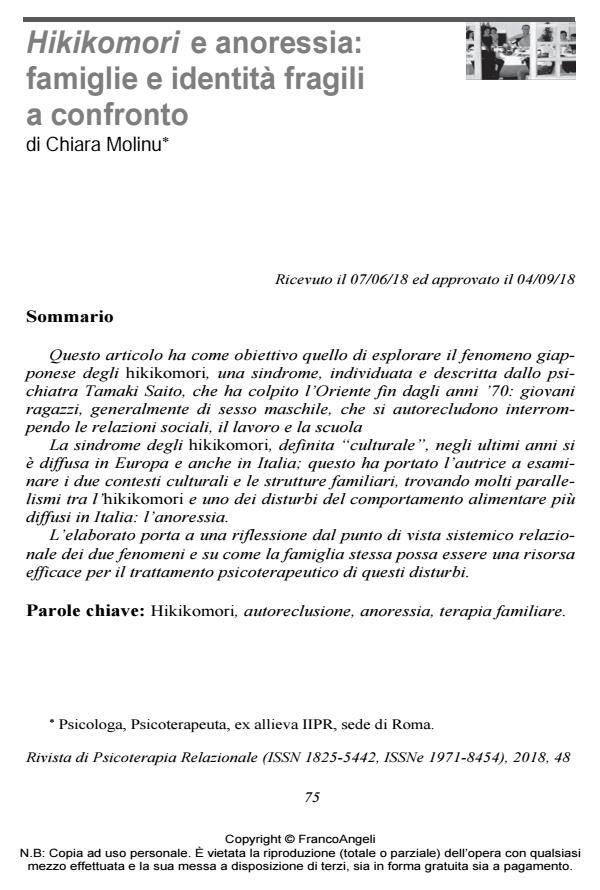Hikikomori e anoressia: famiglie e identità fragili a confronto
Journal title RIVISTA DI PSICOTERAPIA RELAZIONALE
Author/s Chiara Molinu
Publishing Year 2019 Issue 2018/48
Language Italian Pages 22 P. 75-96 File size 284 KB
DOI 10.3280/PR2018-048003
DOI is like a bar code for intellectual property: to have more infomation
click here
Below, you can see the article first page
If you want to buy this article in PDF format, you can do it, following the instructions to buy download credits

FrancoAngeli is member of Publishers International Linking Association, Inc (PILA), a not-for-profit association which run the CrossRef service enabling links to and from online scholarly content.
This article explores the Japanese syndrome "hikikomori", described by the psychiatrist Tamaki Saitō, that has been striking the East since the seventies: young boys become recluses in their own homes, avoiding social situations, like attending school, working, having social interactions outside of their own houses. The Hikikomori syndrome in the last years spread in Europe and Italy; this has brought the author to examine both cultures and family structure and I have found many similarities among Hikikomori and one of the most common eating disorder in Italy: Anorexia Nervosa. The main purpose of this study is to investigate these syndromes from a systemic relational approach and also to conduct a reflection about how the family can be a great resource in the psychotheraphy treatment for this conditions.
Keywords: Hikikomori, social withdrawal, anorexia, family therapy.
- Aguglia E., Signorelli M.S., Pollicino C., Arcidiacono E., Petralia A. (2010). Il fenomeno dell’hikikomori: cultural bound o quadro psicopatologico emergente? Giornale Italiano di Psicopatologia, 16: 157-164.
- APA (2002). DSM-IV-TR. Milano: Masson.
- Beguin A. (1952). Qui est fou? Esprit. 20: 777-88.
- Bourke M.P., Taylor G.J., Parker J.D.A., Bagby R.M. (1992) Alexithymia in women with anorexia nervosa: a preliminary investigation. Br. J. Psych. 161: 240-3. DOI: 10.1192/bjp.161.2.240
- Crisp A.H. (1967). Anorexia Nervosa. Hospital Medicine. 713-718.
- De Matteis E., Toscano M. (2009). La filosofia ANA: il culto dei disturbi del comportamento alimentare su internet. Psicoterapeutinformazione. 4: 71-93.
- Di Iorio G., Cantarelli G. (2011). Nuovi paradigmi psicopatologici: il rapporto tra Internet Addiction Disorder e Hikikomori. Dip. Patol, 1: 23-26.
- DOI T., Saitou T. (2003). Amae e i giapponesi. Tokyo: Asashipress.
- Kato T.A., Tateno M., Shinfuku N. (2012). Does hikikomori syndrome of social withdrawal exist outside Japan? A preliminary international investigation. Soc Psychiatry Psychiatr Epidemiol. 47, 7: 1061-75.
- Koshiba Y. (2007). A study of family functioning in Hikikomori (Social withdrawal. 6: 95-101. DOI: 10.15027/28526
- Loriedo C., Picardi A. (2000). Dalla teoria generale dei sistemi alla teoria dell’attaccamento. Milano: Franco Angeli.
- Mastropaolo L. (2011). Nuove patologie adolescenziali o nuove emergenze sociali? L’hikikomori è solo giapponese? Terapia Familiare, 97: 31-55.
- Minuchin S., Rosman B.L., Baker L. (1978). Famiglie psicosomatiche. L'anoressia mentale nel contesto familiare. Roma: Astrolabio.
- Moretti S. (2010). Hikikomori, la solitudine degli adolescenti giapponesi. Rivista di Criminologia Vittimologia e Sicurezza, 4, 3: 41-48.
- Murphy-Shigematsu S. (2014). Hikikomori: Adolescence Without End. Cult Med Psychiatry, 38, 3: 512-513.
- Ricci C. (2008). Hikikomori: adolescenti in volontaria reclusione. Milano: Franco Angeli.
- Rubinstein E. (2016). Emplotting Hikikomori: Japanese parent’s narratives of social withdraw. Cult. Med. Psychiatry, 40, 4: 641-663.
- Saito T. (2013). Hikikomori. Adolescence without End. University of Minnesota Press.
- Ugazio V. (1998). Storie permesse, storie proibite. Polarità semantiche familiari e psicopatologie. Torino: Bollati Boringhieri.
- Zielenziger M. (2008). Non voglio più vivere alla luce del sole. Roma: Eliott.
Chiara Molinu, Hikikomori e anoressia: famiglie e identità fragili a confronto in "RIVISTA DI PSICOTERAPIA RELAZIONALE " 48/2018, pp 75-96, DOI: 10.3280/PR2018-048003